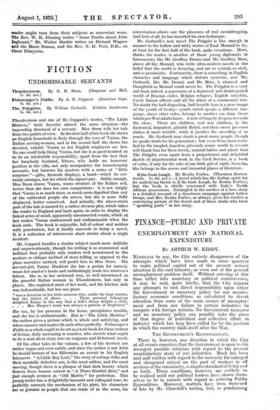FICTION
UNDISMISSABLE SERVANTS
Thunderstorm and one of Mr. Coppard's stories, "The Little
Mistress," both describe almost the same situation—the impending dismissal of a servant. Miss Stern tells her tale from two points of view. In the first half of her book she shows an English household in Italy through the eyes of 'Vanna, the Italian serving-woman, and in the second half she shows the devoted, voluble 'Vanna as her English employers see her.
No one could help liking 'Vanna, but she is so good-hearted as to be an intolerable responsibility, apart from the fact that her busybody husband, Ettore, who holds an honorary position in the villa, not only manipulates the housekeeping accounts, but harrows his masters with a series of "little
surprises "—gifts, firework displays, a band—which he cer- tainly arranges, but for which the signori pay. Oddly enough, Miss Stern draws 'Vanna, warm creature of the Italian soil, better than she does her own compatriots : it is not simply that 'Vanna is so much nicer, so much more dignified than any of the cultivated people she serves, but she is more fully displayed, better conceived. And actually, the above-stairs part of the tale is marred by a rather obvious plot, which takes the reader to England and back again, in order to display the linked series of small, apparently unconnected events, which at last makes 'Vanna undismissed and unclismissable when the book ends. The book is enjoyable, full of colour and written with penetration, but it hardly succeeds in being a novel.
It is a collection of interwoven short stories about a single incident.
Mr. Coppard handles a similar subject much more skilfully and unpretentiously, though his writing is so economical and brilliant that probably only readers well accustomed to the modern or oblique method of story-telling, as opposed to the plain narrative method, will prefer him to Miss Stem. His servant-girl„ Fanny Hackbut (he has a genius for names), wears her master's boots and unblushingly reads her mistress's letters. She is, in her awkward way, as well intentioned as the graceful Italian woman in Thunderstorm, but only in places. She neglected most of her work, and the kitchen sink was indescribable, but her one grace
"was a devotion to her little mistress who, unlike the huge master, had the tiniest of shoes. . . . Those personal belongings delighted Fanny in the way that a doll's things delight a child. . . . Mrs. Harper's room was always a pattern of brightness."
She too, by her presence in the home, precipitates trouble, and she too is undismissable. But in "The Little Mistress" the author gives a picture which is whole and satisfying, and where manner and matter fit each other perfectly. Fishmonger's Fiddle as a whole ought to be set as a text-book for those writers of fiction, daily increasing in number, who stretch what ought to be a neat short story into an exiguous and ill-formed novel.
Of the other tales in the volume, a few of the shortest are rather vague and over-subtle, and since the author is not Irish he should beware of too Hibernian an accent in his English labourers. "A Little Boy. Lost," the story of cottage folks and their mentally defective son, is the most artless, and the most
moving, though there is a glimpse of that dark beauty which flowers from human sorrow in "A Three Handed Reel," and just enough eeriness in "Old Martin" for perfection. This young writer has a delightfully innocent and colloquial tone, he perfectly conceals the mechanism of his plots, his characters
are as genuine as people that one reads of in the news, his
conversation allows one the pleasures of real eavesdropping. And best of all, he has invented his own technique.
Xi% Gerhardi's new novel The Polyglot is like enough in manner to the hollow and witty stories of Paul Morand to be, at least for the first half of the book, quite vexatious. Here, thinks the reader, is another of those young diplomats or bureaucrats, like Mr. Geoffrey Dennis and Mr. Geoffrey Moss, above all like Morand, who write ultra-modem novels in the belief that the world is decaying, and are so cynical, so alert, and so pessimistic. Fortunately, there is something in English character and language which defeats cynicism, and Mr. Gerhardi, like Mr. Dennis and Mr. Moss, is alarmed and thoughtful as Morand could never be. The Polyglots is a very sad book indeed, a panorama of a depraved and disintegrated world of Russian exiles, Belgian refugees, English attaches, Czech liaison officers and all the debris of a continental war. No doubt the half-disgusting, half-lovable hero is a near image of the youth of to-day—youth which speaks a different lan- guage, obeys other rules, belongs to another era than those which pre-War adults know. A note of tragedy deepens towards the close. There are children, real war children, in the hysterical, impudent, pitiable Babel, and their sweet presence makes it more terrible, while it justifies the unveiling of so much. Mr. Gerhardi may shock a great many people, though he speaks truth for his generation ; but even those most horri- fied by the tangled, hopeless, piteously comic world he reveals will thank him for these lovely, natural babies and admit that The Polyglot, even apart from a preposterous and delightful sketch of departmental work in the Civil Service, is a book of value, if only for the sake of one little girl of eight, Natasha. She belongs to the serene and immortal places of literature.






































 Previous page
Previous page